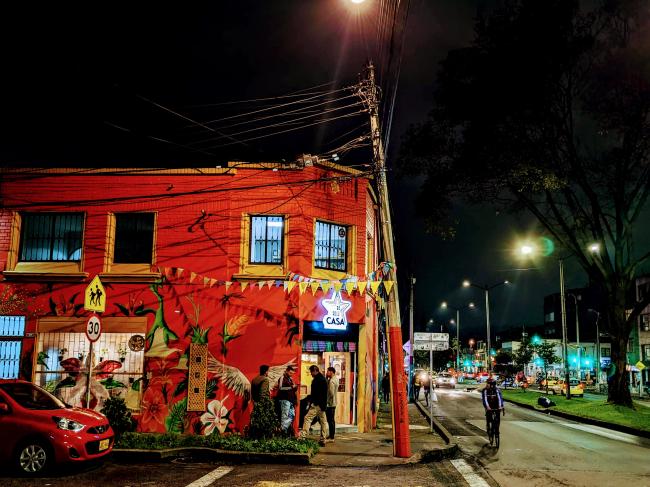
Alexander Monroy brings his fist to his mouth, fanning his fingers high. He kisses his crested hand and inhales. Churukeando, it’s called. The noise imitates the chatter of a monkey—the churuka—native to Colombia’s wild southeast. Combatants in the Revolutionary Armed Forces of Colombia (FARC) used to communicate with this piercing chirp. “It was our alarm clock, how we’d call the troops,” explains Doris Suárez in an interview.
But we are far from the jungle, and Alexander and Doris are no longer armed insurgents. They are former combatants, signees of the 2016 peace accords between the FARC and the Colombian government. Four years after laying down their weapons, they and eight other former guerrillas founded La Trocha (The Path), a craft brewery. Churuka is the name of the second style of beer La Trocha put into production. The name is both serious and light-hearted. A homage to war, it’s also a nod to Colombian slang: here the word mono means both “monkey” and “blonde,” and Churuka is a blonde wheat beer. As the brewers celebrate its release their chirps flit back and forth, a guerrilla soundscape remade as revelry.
La Trocha is one of three breweries recently opened in Bogotá by former FARC combatants. The initiatives are about more than alcohol. They wager that craft beer can anchor economic, political, and social projects to sustain Colombia’s wounded peace process. Against a grim backdrop of violence and inequality, ex-combatant breweries struggle to carve out spaces for community, dialogue, and joy in the heart of Colombia’s capital.
“Clearly we need to make ends meet to survive,” Alexander tells me, “[but] basically we love this country and we love social justice, and you know, this is our gamble.” He gestures to the space around him. The celebration is jubilant, yet it’s impossible to forget how fragile the peace process is. From the ceiling of the brewery’s salon hang 342 paper butterflies: one for each of the former members of the FARC killed since the signing of the peace accords.
“This house vibrates with such warmth, with so much energy, that many people cry when they see the exhibit [in the salon],” says Doris in an interview for the podcast Postales Sonoras. “You feel what the war was, and above all, that this madness can’t be allowed to happen again.”
That’s the meaning of the brewery’s name, she explains. If you don’t tend a trocha, or trail, it becomes overgrown and impassible. The path to peace needs daily care.
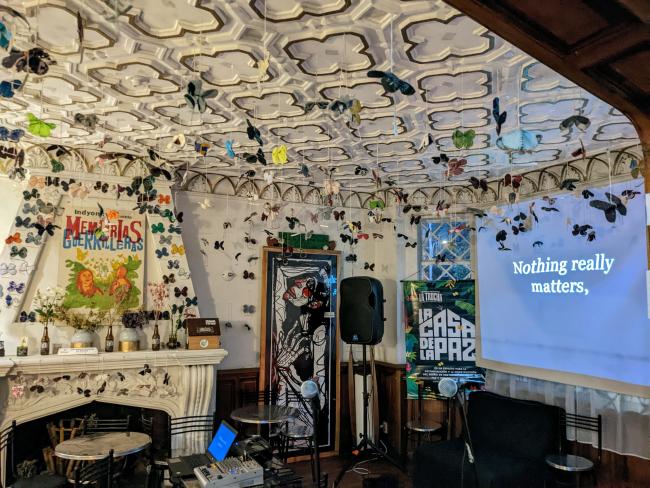
“Beer Is Part of Our Culture”
La Trocha’s home is a historic three-story building called La Casa de la Paz (The Peace House), located in Bogotá’s Teusaquillo neighborhood. For security reasons, there is no sign out front, and the door stays locked—you have to buzz to be let in. Despite these precautions, says Alexander, “we welcome everyone… [but the] people who show up at the door know what they’re here for.”
He calls La Casa de la Paz a “space woven collectively by many hands.” The walls are lined with foods harvested by ex-combatants and there’s a lending library opposite the bar. On Tuesdays the house hosts karaoke. Doris tells me that people sing their hearts out; music helps them tap into emotions they can't always express. On the weekends, the back patio fills with crowds and live music. Students from nearby public universities work the bar; most have been active on the front lines of Colombia’s National Strike. La Casa de la Paz gives them flexible hours to accommodate their studies and organizing.
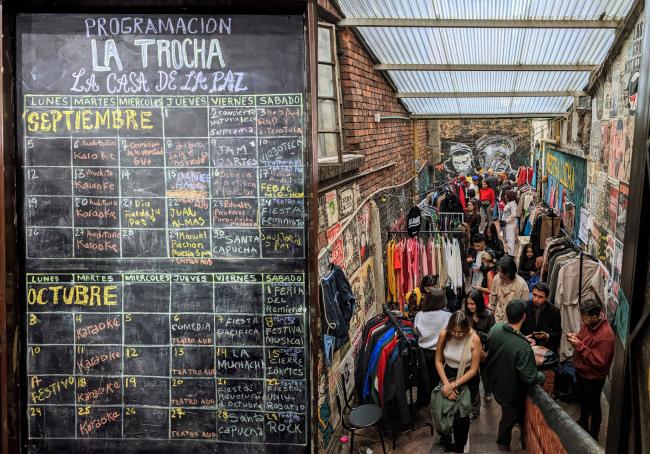
Upstairs a shop for clothing stitched by former combatants also serves as the headquarters for the Unión de Costureros (Sewers' Union), an organization of victims of the armed conflict. On the third floor La Casa de la Paz hosts lectures, workshops, and markets. Since opening in the Spring of 2021, programming has broached topics ranging from food and alcohol sovereignty, to police abolition and the search for those disappeared during the war. Last year, the former leader of the FARC Rodrigo Londoño and Colombia’s ex-president Juan Manuel Santos met at the house to toast the anniversary of the signing of the peace accords.
None of the former guerrillas I spoke with denied that the FARC committed harm. They have studying to do, and atonement. “This is a pedagogical space,” Alexander says, “we’re developing analyses and learning all the time…we’re not saviors.” As much as La Casa de la Paz is a bar and a venue and a place to shop, it remains dedicated to reconciliation, to honest evaluation of the legacies of war.
But Alexander is clear that it’s beer that pays the rent. “La Casa de la Paz is the child of La Trocha.” La Trocha has two lines of production: the bottles sold in-house and in stores are brewed at a commercial facility, while the beer they sell on draft is produced on site, in artisanal batches.
“Making beer is lovely because with four ingredients…you can create all kinds of different flavors. It’s like sancocho [a popular Colombian stew]: I make mine one way and you make yours another,” says Doris. “Beer is part of our culture…it’s an art, you put a little of yourself into it.”
Out of Prison, Out of the Shadows
Like most members of La Trocha, Doris is a former political prisoner. Were it not for the peace deal, she is sure she would have died behind bars. She was captured in her 40s, after 15 years fighting with the guerrilla, and sentenced to 40 years. The accords provided for the release of FARC combatants who served eight years or more in prison. Doris survived “14 years and a day," but she remembers the five months between the signing of the accords and her release as the longest wait of her life. The anticipation and uncertainty were unbearable.
Alexander was a miliciano, an urban affiliate of the guerrilla. “I operated throughout Bogotá,” he tells me, but he never disclosed his clandestine double life, and he was never captured. He internalized the habits of war: anxiety, watchfulness, distrust. Only when he became part of La Trocha could he start to open up, to have “difficult conversations” about his role in the FARC.
For Doris, the accords meant freedom; for Alexander, the opportunity to face his past. The terms of the accords also provided the initial capital for La Trocha. Each ex-combatant received eight million pesos (about $2000) from the Agency for Reincorporation and Normalization (ARN). Pooled together, this was the seed money for the brewery. Now the business is self-sustaining, but narrowly. Their goal is to earn enough to buy the house, to ensure La Trocha’s survival into the future.
Empty Promises
Adriano (an alias he uses to protect his privacy) didn’t plan to become a brewer. For decades, he dedicated his life to armed struggle to topple the Colombian state.
“[Being in] the guerrilla taught me to interpret things,” he says. “Contradictions. Antagonisms. Politics are everywhere, in every moment.” Adriano looks at his hands as he speaks. “We fought the war for people, for sovereignty…That didn’t stop when we signed the accords.”
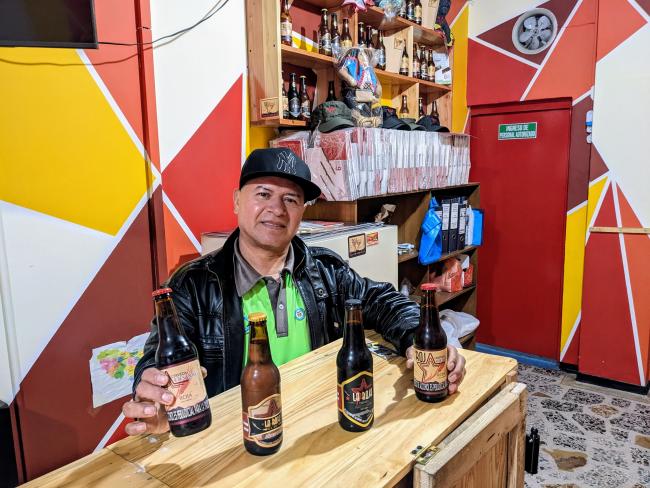
After the peace accords, he turned in his weapon and settled in one of the Territorial Spaces for Training and Reincorporation (ETCR) established by the ARN. Despite pledges from the government for protection and support, life in the isolated ETCR grew increasingly precarious. The agricultural and sewing ventures Adriano pursued met with frustration as the ARN failed to disburse funds on time, if at all. “When [then-President Iván] Duque visited, he toured the community, promised us investments,” Adriano says, “but that money was stolen. It disappeared.”
Under Duque’s administration, the Colombian government weakened the peace process by halting, delaying, and underfunding key provisions of the accords. Rural development programs faltered. Violence, which had declined during the years of negotiation, began to spike. Massacres and targeted killings of social leaders and former FARC combatants increased. Bloodshed reached the highest levels of the past half decade. As the anthropologist Jaime Amparo Alvarez argues, for many across Colombia, “the ‘post’ of the postwar is experienced as a moment of uncertainty and anxiety…as war by other means…as disenchantment, deception, or something worse than war.”
Like the vast majority of his former comrades-in-arms, Adriano was determined to honor his commitment to peace, but he struggled to see a way forward. Then he met Wally Broderick, and the brewery La Roja was born.
La Roja Taps Into a Long Brewing Lineage
Colombians enjoy beer. They drink some 2.3 billion liters each year, more per capita than Ukraine, Argentina, or Japan. Beer-making was a cottage industry in Colombia until the 1880s, when German and Danish immigrants founded the country’s first large-scale commercial producers. Breweries flourished from Cali to Cúcuta in the first decades of the 20th Century, but the depression of the 1930s forced most to shutter or sell. The Bavaria Consortium gobbled up competition to consolidate a near-monopoly of the national market. Today Bavaria retains its stranglehold, selling 97 percent of beer purchased in Colombia, but a growing number of craft brewers are challenging the behemoth.
La Roja started small. Wally, a skilled brewer, was childhood friends with Carlos Grajales, a former FARC combatant who resettled in the same ETCR as Adriano after disarmament. Wally witnessed how difficult it was for Carlos and his comrades to get their projects off the ground. He reasoned that craft beer might succeed where other initiatives had not.
Wally led a workshop with Carlos, Adriano, and a few others. They began brewing in 25-liter batches, labeling bottles with a star and the name La Roja to signal their leftist origins. Sales took off, and production couldn’t keep up. The team reinvested their earnings and invited more ex-combatants to join. They obtained loans from supporters and dug into what little savings they had. In total, 22 former FARC guerrillas pooled their resources to launch La Roja. “It started with 22 people, but really it’s 22 families,” Adriano says, chuckling. “Imagine, in the six years since we left the ranks, lots of little kids have come along.”
In 2019, La Roja moved production to Bogotá. The ECTR was too far from markets, and too dangerous. Now Adriano brews in a converted garage six days a week.
“Beer is art, history, culture, gastronomy, revolution,” he says, showing me the towering stainless-steel tanks. He makes three styles of beer for La Roja. He also brews for the allied ex-combatant brewery, La Alternativa, and for a list of others. Orders keep coming in, especially now that the brewery has obtained certification from Colombia’s beverage regulatory agency. “Under Duque, we kept applying and applying and nothing,” Adriano says. “For three years. But once Petro was elected, all it took was eight days.”
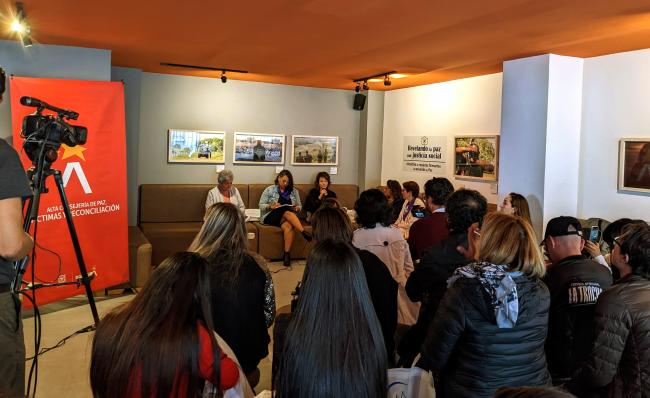
All this production is exhausting, but Adriano’s political commitment keeps him going. He sees his work as a contribution to the “fight for life everywhere.”
In September, La Roja opened the doors of a bar and event space: La Casa Cultural La Roja. A 15-minute walk from La Casa de la Paz, it is the brewers’ second attempt after their first bar was burglarized twice and forced to close last year.
The renovated house is open and bright. Photographs by women ex-combatants pop against the fresh white walls. The bar highlights the struggles of reintegrated women as prisoners, political leaders, and workers. The bartender suggests I try La Comunera, a brown ale that Adriano brews with coffee grown by a collective of women ex-combatants. It’s malty and well-balanced. I gladly order another.
The Struggle Continues
On the day I spoke with Adriano, he was working alongside another former combatant. Wilmer (last name withheld by request) is in his late 40s. His resumé has a decades-long gap and he’s disabled: he lost an eye in combat. Like many former combatants, he experienced rejection from the civilian labor market. La Roja was the only place to offer him a steady job. More than the paycheck, though, Wilmer insists that his work matters because it keeps him connected to his years of struggle in the FARC.
He pauses when I ask about “demobilized” fighters. “To say ‘demobilized,’ that’s not correct,” he explains. “Call us reincorporated, signees of the peace accords, ex-combatants, sure, but to call us ‘demobilized’ implies that we gave up the fight. That’s not true. It was a negotiated peace. And now the struggle continues by other means.”
All the brewers I spoke to echoed Wilmer’s refusal to be depoliticized by their transition to civilian life. They challenge the model of reintegration pushed for years by the ARN, a model premised on individual entrepreneurship and the abandonment of revolutionary solidarity. These brewers maintain that peace does not require them to cede the values that motivated their militancy. They labor to nurture an alternative to the status quo of neoliberal competition.
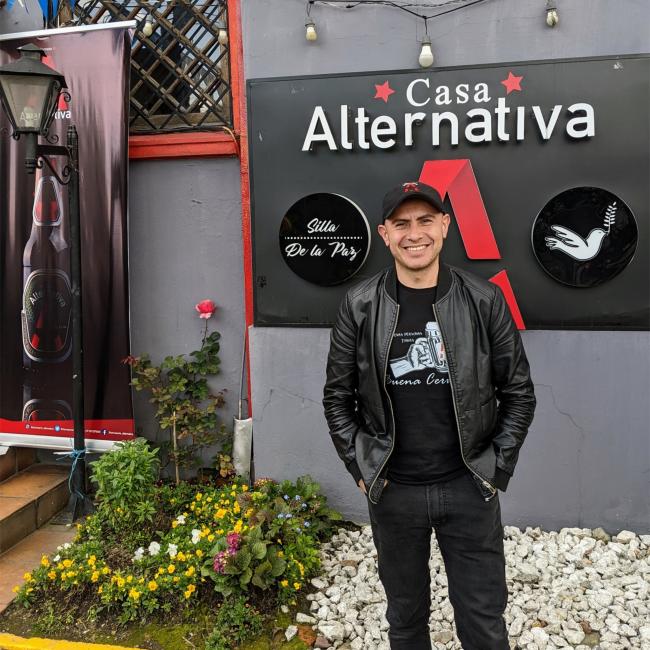
Appropriately, the third ex-combatant brewery in Teusaquillo is called La Alternativa. On the day I visit one of its founders, Manuel Bolívar, is giving a talk to a group of university students about the peace process. It’s an assignment—their professor encourages them from the back of the room—but after class ends they linger, order more drinks, gaze at the art that papers the walls. Beer is good at keeping people talking.
It is a few weeks before Halloween, and Manuel invites everyone to an upcoming haunted house event.
I think about the paper butterflies in La Casa de la Paz, about the lives that peace has cost. Manuel has just been discussing the threats he and other signees of the peace accords face. In February, he found a homemade bomb while cleaning the women’s bathroom. He picked it up and ran it outside, his heart racing, flashing back to the times he was nearly killed in combat.
I ask if the haunted house is a critique of this insecurity.
He laughs. “Not at all! It’s just fun.”
Joseph Hiller is a PhD candidate in Cultural Anthropology with a certificate in Gender, Feminist, and Sexuality Studies at Duke University. He is based in Bogotá with support from the Wenner-Gren Foundation and from the Grupo de Prisiones (Prison Group) at the Facultad de Derecho (School of Law) at la Universidad de los Andes.

